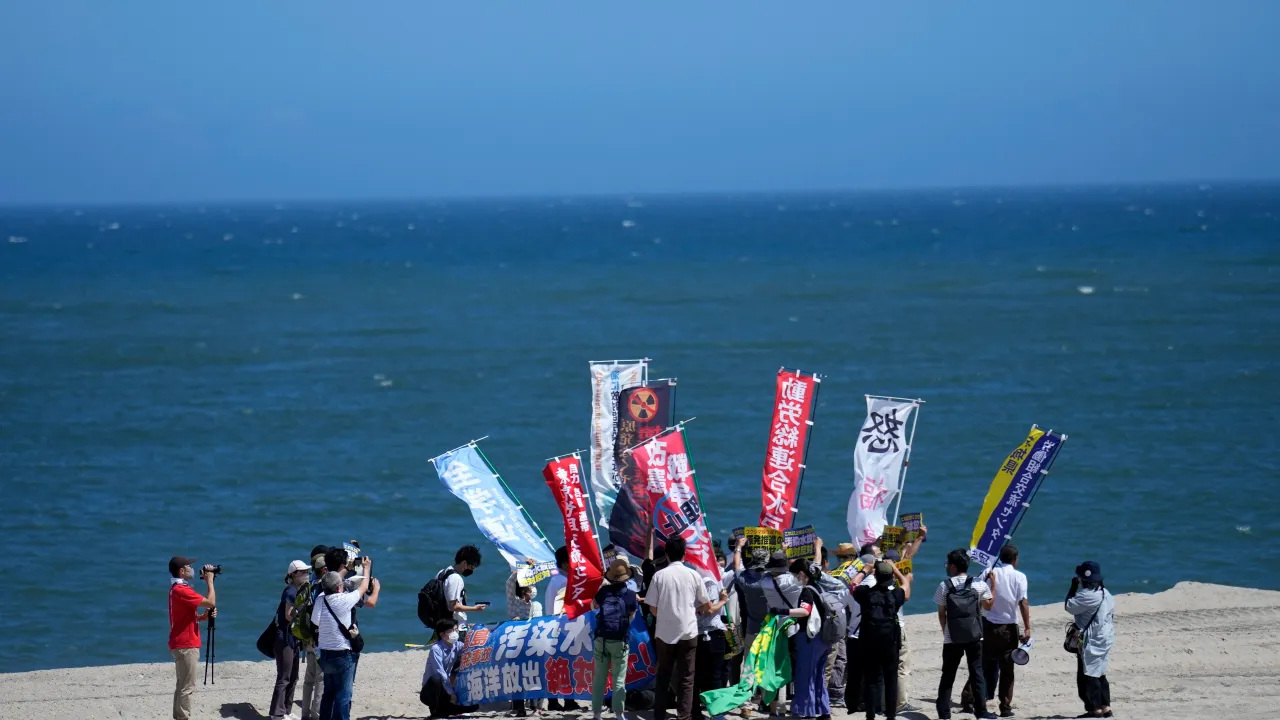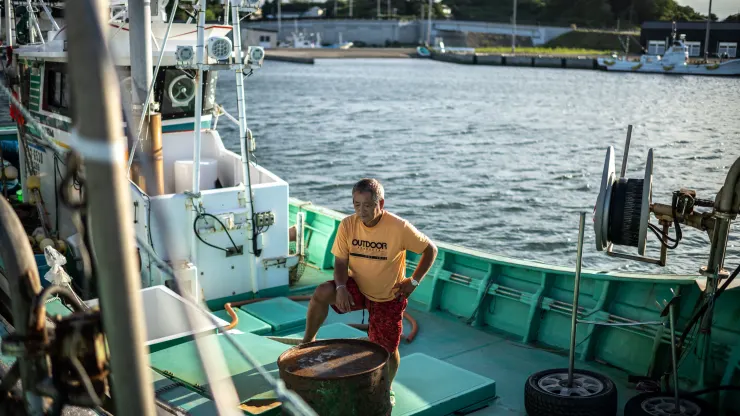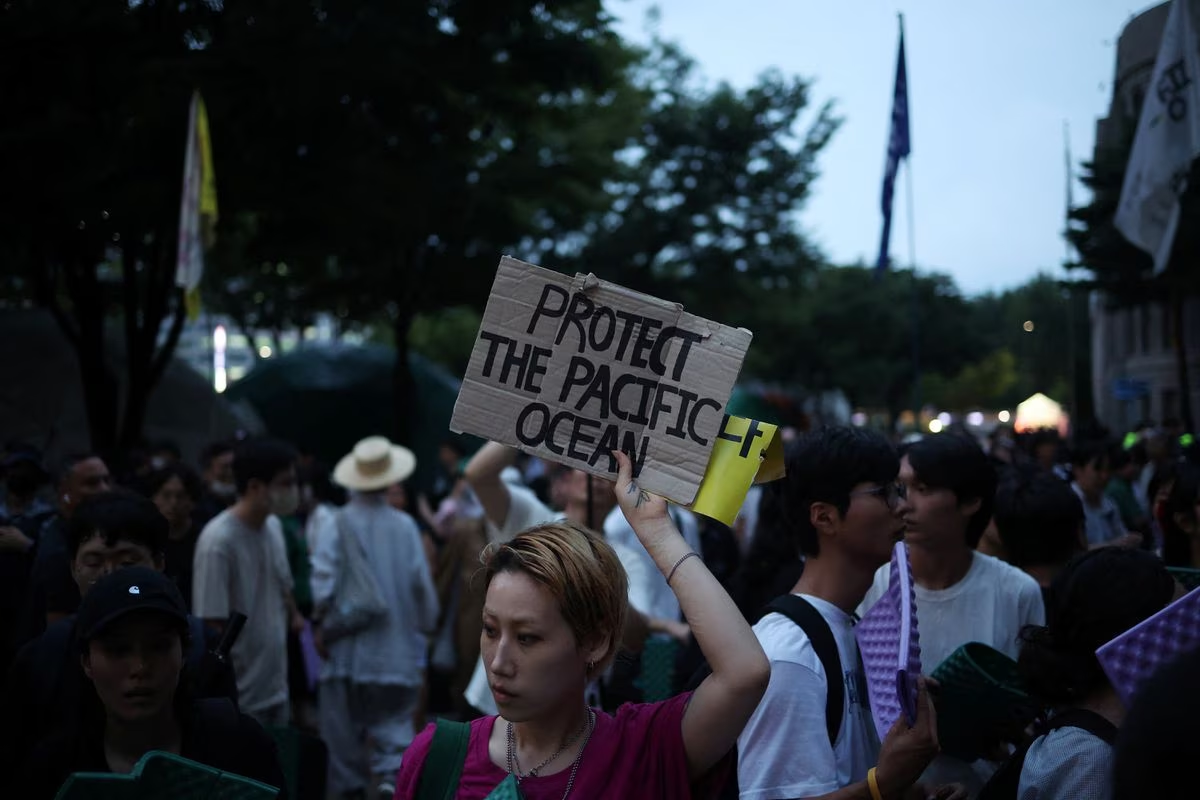
People protest at a beach toward the Fukushima Daiichi nuclear power plant, damaged by a massive March 11, 2011, earthquake and tsunami, in Namie town, northeastern Japan, Thursday, August 24, 2023. /CFP
People protest at a beach toward the Fukushima Daiichi nuclear power plant, damaged by a massive March 11, 2011, earthquake and tsunami, in Namie town, northeastern Japan, Thursday, August 24, 2023. /CFP
Japan started discharging treated radioactive water from the Fukushima Daiichi nuclear power plant into the Pacific Ocean on Thursday, raising concerns among international communities about potential environmental and health repercussions.
The gradual discharge of approximately 1.3 million metric tonnes of wastewater is expected to span around 30 years, according to Tokyo Electric Power Company (TEPCO), the operator of the plant. The company plans to release 31,200 tons of the treated water by the end of March 2024.
The water release begins more than 12 years after the nuclear catastrophe in March 2011. Since then, extensive efforts have been underway to stabilize the situation and confine the spread of radioactivity. Workers have pumped water through the remains to prevent the debris from overheating and exacerbating the existing damage.
Despite Japan's ongoing collection and storage of the contaminated water in tanks for over a decade, the available space is becoming increasingly limited. Currently, the water occupies more than a thousand steel tanks, densely arranged across the Fukushima campus.
Opposing voices within the country
The Japanese government has argued that the proposed release of treated water will be carried out in a safe manner and that the treated water meets safety standards. Authorities have also claimed that this step is essential to the extensive and costly process of decommissioning the plant.
"Releasing the treated water into the sea is a realistic solution," former Prime Minister Yoshihide Suga stated during a cabinet meeting in 2021. "We will do our utmost to keep the water far above safety standards."
While the Japanese government asserts that this practice is commonplace in the nuclear industry and that other nations have safely discharged treated wastewater into the ocean previously, local fishing communities are worried that it could impact their businesses and livelihoods. They also fear that it might further tarnish the reputation of their seafood industry.
"Our position has not changed, and we continue to be opposed," Masanobu Sakamoto, head of the National Federation of Fisheries Cooperative Associations, said Monday after meeting with the country's Prime Minister Fumio Kishida.
"Our understanding about the safety of the treated water has deepened, but scientific safety and safety from a social point is different. Once the water is released, there will be reputational damage," he said.

Fisherman Haruo Ono stands on one of his fishing boats at Tsurushihama Fishing Port, Shinchi-machi of Fukushima Prefecture, some 60 kms north of the crippled Fukushima Daiichi nuclear plant on August 21, 2023, ahead of a government's plan to begin releasing treated water from the plant into the Pacific Ocean. /AFP
Fisherman Haruo Ono stands on one of his fishing boats at Tsurushihama Fishing Port, Shinchi-machi of Fukushima Prefecture, some 60 kms north of the crippled Fukushima Daiichi nuclear plant on August 21, 2023, ahead of a government's plan to begin releasing treated water from the plant into the Pacific Ocean. /AFP
Opposition from neighbors and Pacific island countries
The ripples from releasing the nuclear wastewater have far extended beyond Japan, with people in its neighboring countries expressing concerns over seafood and ocean contamination.
On Thursday, South Korea reiterated its decision to maintain the ban on importing Japan's fishery products. The import restrictions imposed cover all fishery products originating from eight Japanese prefectures, including Fukushima.
In recent days, public concern in South Korea has remained high. Environmental and civic groups across the country escalated their protests on Wednesday, emphasizing that the actions of the Japanese government could potentially endanger lives and have serious impacts on future generations.
Lee Jae-myung, leader of the main opposition Democratic Party, said that frustrated fishermen and traders have warned that if Japan proceeds with releasing the radioactive wastewater, the South Korean fishery industry will face a catastrophic collapse.
In response to the release, China also announced its decision to suspend all seafood imports from Japan starting on Thursday. The suspension, which includes aquatic products such as seafood, is being implemented to safeguard the well-being of Chinese consumers, according to the General Administration of Customs.

A woman holds up a placard in central Seoul, August 22, 2023. /Reuters
A woman holds up a placard in central Seoul, August 22, 2023. /Reuters
For Pacific island countries whose economies are heavily reliant on the fishing industry, the Fukushima water release is poised to affect the livelihood of local residents.
In a press release earlier on Thursday, Prime Minister of the Solomon Islands Manasseh Sogavare expressed strong opposition to Japan's decision, saying it "has an impact on our people, ocean, economy and livelihood."
The ocean is vital to the countries of the Pacific, he said during an exclusive interview with China Media Group (CMG), emphasizing that if the discharge is not deemed safe, it should not be proceeded with.
"Pacific peoples are coastal peoples, and the ocean continues to be an integral part of their subsistence living," said Henry Puna, the secretary-general of the Pacific Islands Forum, which comprises 18 independent Pacific island countries.
"It was agreed that we would have access to all independent scientific and verifiable scientific evidence before this discharge takes place. Unfortunately, Japan has not been cooperating," he told Stuff, a New Zealand-based media organization.
Puna noted that from the very beginning, members of the Pacific Islands Forum firmly advocated for Japan to refrain from any such discharge until they could ascertain the potential ramifications for both the environment and human health.
Concerns among scientists
Marine scientists have also expressed concerns about the possible impact of the discharge on marine life and fisheries.
"This is truly a trans-boundary issue," said Robert Richmond, a research professor from the School of Ocean and Earth Science and Technology at the University of Hawaii at Manoa.
"Fish don't respect political lines, and neither do radionuclides or pollutants in the ocean," said Richmond, who has conducted marine conservation research in the Pacific for more than four decades.
The decision dismisses scientific evidence, violates the human rights of communities in both Japan and the Pacific region, and stands in violation of international maritime law, said experts from Greenpeace, a nonprofit organization committed to preventing toxic pollution.
"Instead of engaging in an honest debate about this reality, the Japanese government has opted for a false solution – decades of deliberate radioactive pollution of the marine environment – during a time when the world's oceans are already facing immense stress and pressures," said Shaun Burnie, a senior nuclear specialist at Greenpeace East Asia.
"This is an outrage that violates the human rights of the people and communities of Fukushima and other neighboring prefectures and the wider Asia-Pacific region."